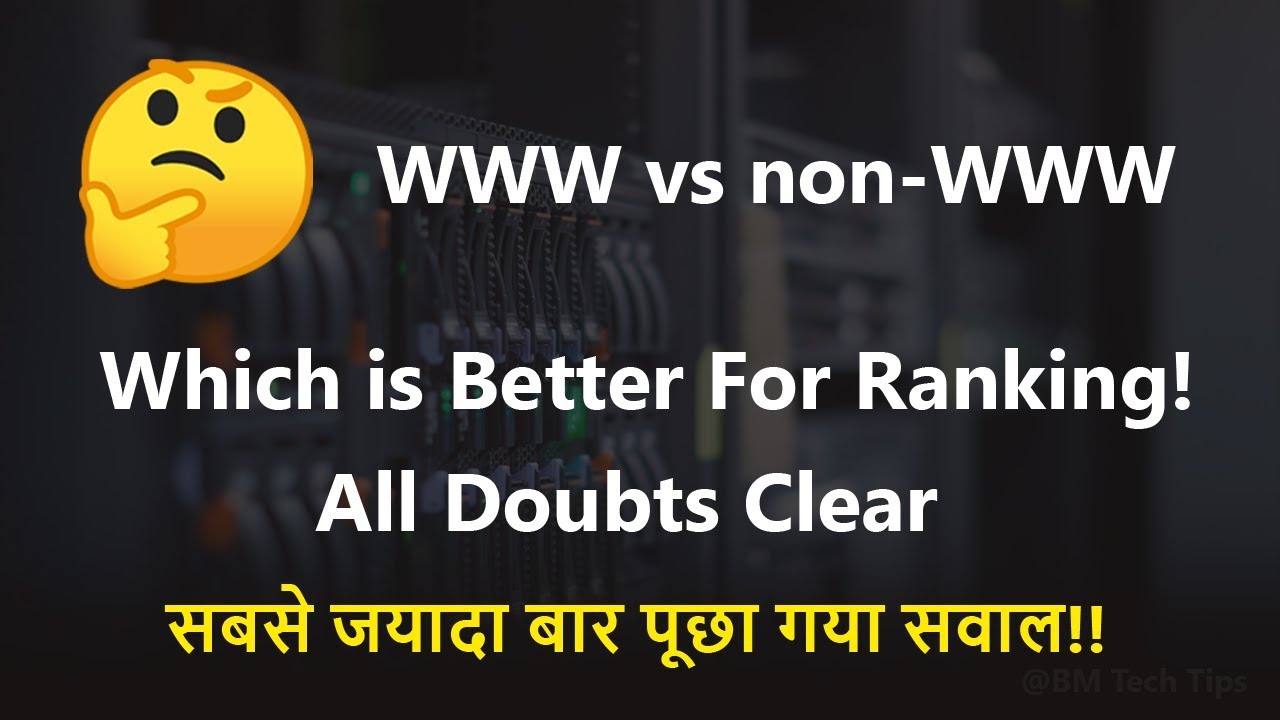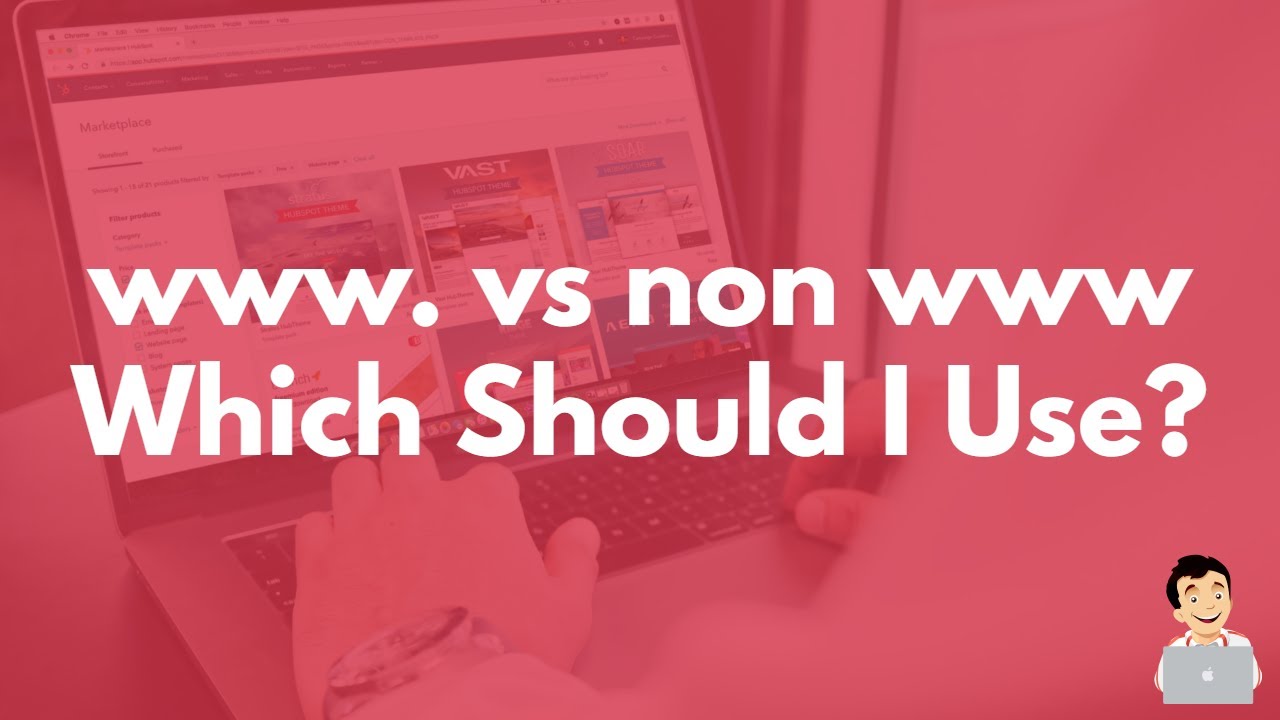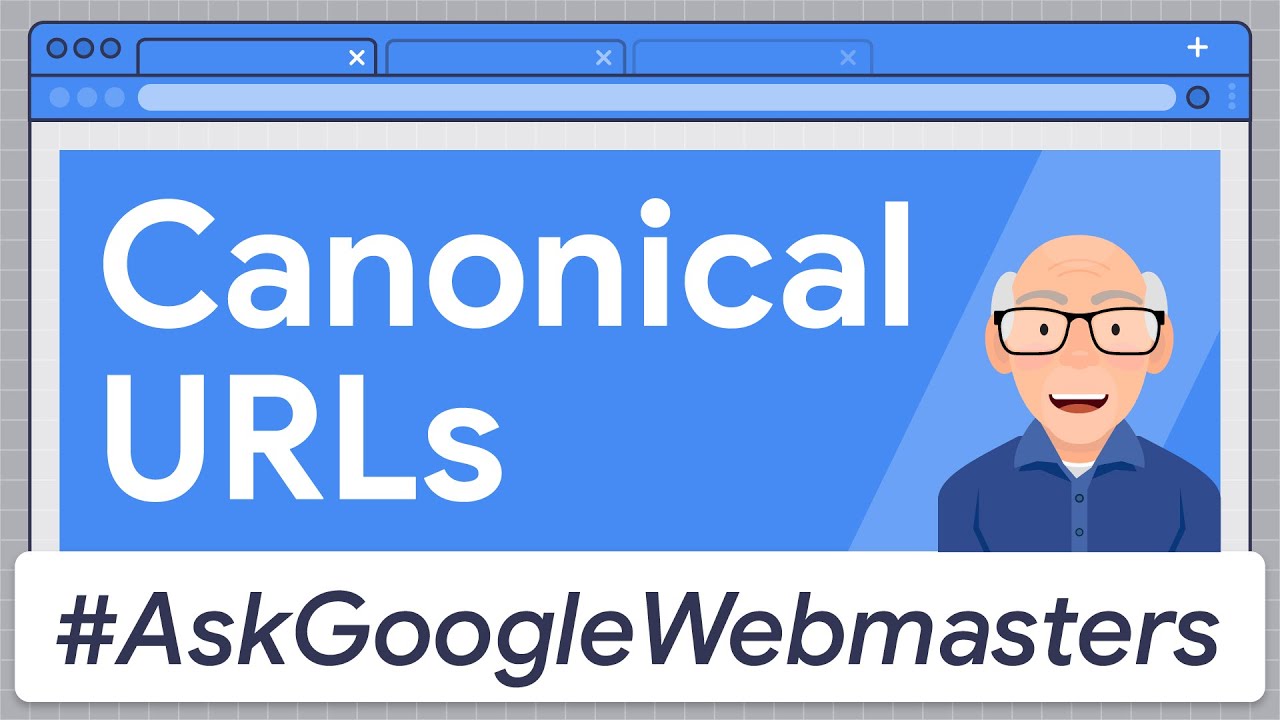In the vast realm of the internet, where every detail can impact user experienceand digital identity, the debate over using "www" or non-"www"URLs continues to captivate web developers, marketers, and SEOexperts alike. At first glance, this debate might appear to be a mere technicality, but it carries profound implications for a website's aesthetics, branding, and online visibility. The decision between these seemingly slight variations can shape a user's first impression and influence a website's position in the digital landscape.
What Are WWW And Non-WWW?

Difference Between WWW vs NON-WWW Domains & Which One is Better for SEO?
"WWW" and "non-WWW" refer to two variations of the prefix used in URLs (Uniform Resource Locators), which are the addresses used to access websites on the internet.
- WWW (World Wide Web): This is the traditional prefix that has been used for decades in URLs. It stands for "World Wide Web" and is used to designate web-related resources on the Internet. For example, "www.example.com" would be a website address with the "www" prefix.
- Non-WWW: This refers to URLs that omit the "www" prefix. Instead of "www.example.com," the URL would simply be "example.com." In recent years, there has been a trend toward using non-"www" URLs for various reasons, including aesthetics, simplicity, and branding.
Both versions of the URL usually point to the same contenton a website. It's common practice to set up redirects so that if a user enters the "www" version of the URL, they are automatically redirected to the non-"www" version or vice versa. This ensures that users have a consistent experience regardless of the URL variation they type in.
From a technical perspective, search engines are capable of handling both "www" and non-"www" versions of a domain equally well. The choice between the two typically comes down to branding preferences, user experience considerations, and individual organizational strategies.
WWW Pros And Cons
Using or not using the "www" prefix in URLs comes with its own set of pros and cons. Let's take a closer look at the advantages and disadvantages of using "www."
Pros Of Using WWW
- Familiarity and Tradition -Many internet users are accustomed to seeing "www" in URLs, and associating it with websites. Using the "www" prefix can evoke a sense of familiarity and tradition, which might contribute to a perception of legitimacy.
- Clear Distinction -Including "www" can help distinguish a website's main domain from subdomains or other online services. This can be particularly beneficial for larger organizations with diverse online offerings, making it clear that users are accessing the main website.
- Technical Flexibility -Using "www" can provide technical flexibility in managing DNS records. It allows for the potential routing of different services (email, FTP, etc.) to separate servers, making server administration more efficient.
Cons Of Using WWW
- Length and Complexity -Including "www" in URLs can make them longer and more complex. Longer URLs can be harder to remember, share, and type accurately, potentially leading to user errors and reducing the likelihood of users accessing the website directly.
- Aesthetic Considerations -In the age of minimalistic design and clean aesthetics, the "www" prefix might be seen as unnecessary visual clutter in URLs. Omitting "www" can result in a cleaner and more streamlined appearance.
- Potential for Confusion -While "www" is familiar to many users, there's a segment of internet users who are not tech-savvy and might find the presence of "www" confusing. Omitting it could make the URL more intuitive for such users.
- SEOImplications -While search engines like Google can handle both "www" and non-"www" URLs equally well, some SEOexperts argue that shorter URLs might have a slight advantage in terms of search enginerankings. Shorter URLs could be perceived as more relevant and concise.
- Branding Flexibility -Omitting "www" can offer more branding flexibility, allowing businesses to create memorable and concise domain names that align better with their branding strategy.
Non-WWW Pros And Cons
Choosing to use non-"www" URLs also presents its own set of pros and cons. Let's explore the advantages and disadvantages of using non-"www."
Pros Of Using Non-WWW
- Simplicity and Cleanliness -Non-"www" URLs are often shorter and simpler, which can result in a cleaner and more elegant appearance. Short URLs are easier to read, remember, and share, enhancing the overall user experience.
- Aesthetics -In the era of minimalist design and user-friendly interfaces, non-"www" URLs align well with modern design sensibilities. They can contribute to a more visually appealing and less cluttered browsing experience.
- Branding -Non-"www" URLs provide more flexibility for branding. Organizations can create concise, memorable domain names that align closely with their brand identity. This can lead to a stronger and more impactful online presence.
- Perceived Relevance -Some argue that non-"www" URLs might be perceived as more modern and relevant. The absence of "www" could suggest that a website is up-to-date with current web practices and technology.
- Search Engine Rankings -While the impact is debated, some SEO experts suggest that shorter URLs might have a slight advantage in search engine rankings due to their perceived relevance and user-friendliness.
Cons Of Using Non-WWW
- User Expectations -While modern users are becoming more accustomed to non-"www" URLs, there's still a significant portion of the population that associates "www" with websites. Using non-"www" URLs might initially confuse some users.
- Technical Challenges -While modern web servers and content management systems are equipped to handle non-"www" URLs, there might be some technical challenges in configuring and maintaining the server to support this choice.
- Transition Challenges -If you're migrating from "www" to non-"www" or vice versa, implementing proper redirects is crucial to ensure a seamless transition for users and to preserve SEO equity.
- Subdomains -If your website relies heavily on subdomains, using non-www" URLs might lead to confusion in distinguishing between the main domain and subdomains.
- Legacy Systems -Some older systems, tools, or browsers might not handle non-"www" URLs as effectively as traditional "www" URLs. Ensuring compatibility across various platforms is important.
Is WWW Vs. Non-WWW A Ranking Factor?

WWW vs non-WWW - Which is Better For Ranking! in 2019
A site's URLs that start with www and those that don't (like https://www.example.com/ and https://example.com/) often lead to the same place on a computer. But based on how the server is set up, they may point to different places, so search engines can't assume they are the same.
Note that having both versions of the site's URL mentioned in your account won't stop your site from being indexed as long as you have only submitted a Sitemap for the version you want to be indexed. Don't send a Sitemap for both copies if they are in the same place and have the same information.
However, it's important to note that while the "www" itself is not a ranking factor, there are related factors that can indirectly influence your website's SEO and user experience:
- User Experience and Engagement -The choice between "www" and non-"www" can impact user experience and engagement. Shorter, more user-friendly URLs are easier to remember, share, and type. This can lead to higher click-through rates and better user engagement, which indirectly affects search rankings.
- Click-Through Rates (CTR) -Shorter URLs may appear more concise and relevant in search results, potentially leading to higher CTRs. A higher CTR can indicate to search engines that your content is valuable and relevant, which can contribute to improved rankings.
- Redirection and Canonicalization -If you decide to switch from "www" to non-"www" or vice versa, implementing proper redirects and canonicalization is crucial to ensure that search engines understand the preferred version of your URL. Mishandling these redirects can lead to duplicate content issues and negatively impact SEO.
- Branding and Trust -The version of your URL you choose can also impact your brand's perception and trustworthiness. Users might have certain expectations regarding URLs, and consistency in your URL structure can help build trust.
- Mobile-First Indexing -Google's emphasis on mobile-first indexing focuses on the mobile version of your site. While the "www" itself isn't a factor, the mobile-friendliness of your website (which is closely related to user experience) is a significant ranking factor.
The domain nameyou choose can have a big effect on your UX and public image. Usually, your domain name should be the thing that people remember most about your business. Sometimes it's not your businessname but a brand or symbol.
For different features, you might want to use subdomains or even separate domains. If you sell things that resellers also sell, this can make it easier for your buyers to find you.
WWW Vs Non-WWW - Which One Should I Use?

www. vs non www. , Which Should I Use?
Deciding whether to use "www" or non-"www" in your URLs depends on various factors, including your branding strategy, user experience goals, and technical considerations. There's no one-size-fits-all answer, as both options have their merits. Here are some points to consider when making your decision:
Factors To Consider
- Branding Strategy -Consider your brand identity and how you want users to perceive your website. If you prefer a cleaner, more modern look, non-"www" URLs might align better with your branding.
- User Experience -Think about your target audience's expectations and familiarity with URLs. If your audience is accustomed to seeing "www" and might find non-"www" confusing, sticking with the traditional prefix might be a safer choice.
- Aesthetics -Consider the visual impact of both versions. Non-"www" URLs often look cleaner and can contribute to a more elegant design, while "www" might feel more traditional.
- Simplicity -Non-"www" URLs tend to be shorter and easier to remember and share. If simplicity is a priority, non-"www" might be the way to go.
- Search Engine Optimization(SEO) -While the "www" itself is not a direct ranking factor, the user experience, engagement, and click-through rates that result from your URL choice can influence SEO. Consider how each option might affect these factors.
- Technical Considerations -Assess the technical feasibility of your choice. Both options are technically viable, but you'll need to ensure proper configuration and redirects if you're switching from one to the other.
Making The Decision
- Consistency -Whichever option you choose, consistency is key. Use the same version across your entire website to avoid confusion for users and search engines.
- Redirects -If you're transitioning from one version to another, set up proper 301 redirectsto ensure a smooth transition and avoid duplicate content issues.
- Testing -Consider conducting user testing or surveys to gauge your audience's preferences and perceptions of "www" and non-"www" URLs.
- Future Scalability - Think about your website's potential growth and future services. Will "www" or non-"www" better accommodate your future needs?
- Consult Professionals -If you're unsure, consider consulting with web developers, SEO experts, or branding specialists who can provide insights tailored to your specific situation.
The Importance Of Setting Canonical URLs

Canonical URLs: How Does Google Pick the One?
In the complex landscape of website optimization and search engine rankings, canonical URLs play a crucial role in maintaining content integrity, SEO performance, and user experience. Canonical URLs provide a way to signal to search engines the preferred version of a webpage when multiple variations of the same content exist. This seemingly technical aspect holds significant importance in ensuring that your website's content is properly indexed and displayed in search results.
Understanding Canonical URLs
Canonical URLs are used to address duplicate content issues that can arise when a single piece of content is accessible through multiple URLs. These variations might stem from different URL parameters, session IDs, or multiple versions of a webpage. Search engines might treat these variations as separate pages, potentially diluting the authority and rankings of the primary content.
By setting a canonical URL, you explicitly indicate which version of the content should be considered the primary source. This helps search engines consolidate the ranking signals and prevents duplicate content from competing against itself in search results.
Benefits Of Canonical URLs
- Improved SEO Performance -Canonical URLs consolidate the SEO value of duplicate content variations onto the preferred version. This can lead to better search engine rankings and visibility for the primary content.
- Prevention of Duplicate Content Penalties -Search engines may penalize websites for hosting duplicate content. Canonical URLs help prevent such penalties by indicating the original and authoritative source.
- Enhanced Indexing -Search engines can allocate their crawling resources more effectively when they know which version of a page is canonical. This results in faster and more accurate indexing.
- Consistent User Experience -Canonical URLs help ensure that users are directed to the preferred version of a page, avoiding confusion and providing a consistent browsing experience.
- Link Equity Consolidation -Inbound links from external sources and internal links from your site can be scattered across different URL variations. Canonical URLs consolidate these links, concentrating the link equity on the primary version.
- Mobile and Desktop Versions -If you have separate mobile and desktop versions of your site, setting canonical URLs helps avoid content duplication and ensures that search engines understand the relationship between the versions.
Implementing Canonical URLs
Setting canonical URLs involves adding a <link rel="canonical">tag to the HTML header of a webpage. This tag points to the preferred version of the content. Alternatively, canonical URLs can be set through server-side redirects or configuration settings, depending on the platform you're using.
People Also Ask
What Is The Difference Between WWW And Non-WWW?
The main difference lies in the URL structure. "WWW" stands for "World Wide Web" and is a traditional prefix in URLs. Non-WWW URLs omit this prefix. Both versions can point to the same content, but the choice impacts aesthetics, branding, and user experience.
Does Using WWW Affect SEO?
The "www" itself is not a direct SEO ranking factor. However, user experience, click-through rates, and content engagement, influenced by your URL choice, can indirectly affect SEO. Both "www" and non-"www" can be optimized effectively for search engines.
Is It Better To Use WWW Or Non-WWW For Branding?
The choice depends on your branding strategy and target audience. Non-"www" URLs can offer a cleaner, more modern look and can align well with minimalist branding. "WWW" might be preferred if you want to emphasize tradition and familiarity.
Do I Need To Redirect From WWW To Non-WWW?
Redirects are recommended when switching from "www" to non-"www" or vice versa. This ensures that users are directed to the preferred version and prevents duplicate content issues. Proper 301 redirects should be set up to preserve SEO equity.
Which Version Is Better For Mobile SEO: WWW Or Non-WWW?
From a mobile SEO perspective, both "www" and non-"www" can perform well. What matters most is a responsive design, fast loading times, and mobile-friendly content. Focus on providing a seamless user experience across devices.
Conclusion
In the ongoing saga of "www" vs. non-"www," the web has demonstrated its capacity to accommodate diverse perspectives and approaches. As technology advances and user preferences evolve, the significance of this debate might wax and wane. However, what remains clear is that the choice between "www" and non-"www" is far from trivial. It's a decision that intertwines technical functionality, user expectations, branding aspirations, and even SEO strategies.
In this digital age, where first impressions are often made within seconds and online competition is fierce, the decision regarding "www" in a URL can significantly impact a website's identity and user engagement. As the virtual realm continues to evolve, one thing is certain: the debate will persist, reminding us that even the tiniest details can shape the vast expanse of the World Wide Web.
